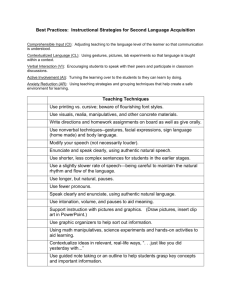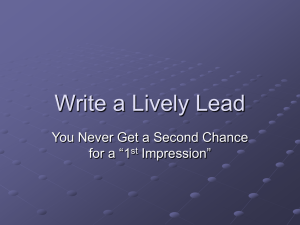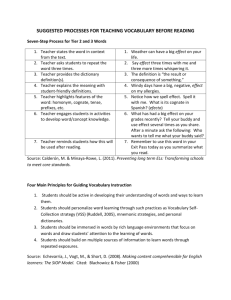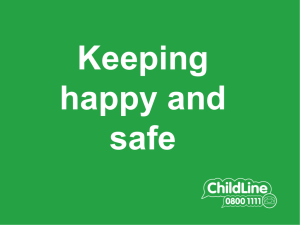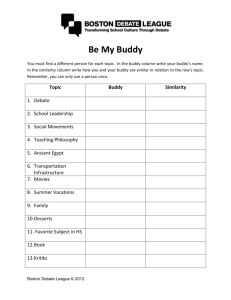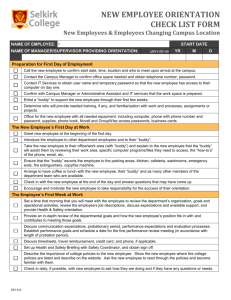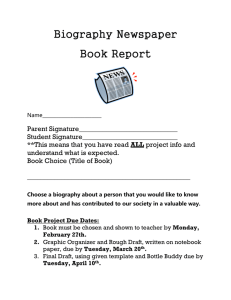Buddy-THE-BUDDY-HOLLY-STORY-1
advertisement
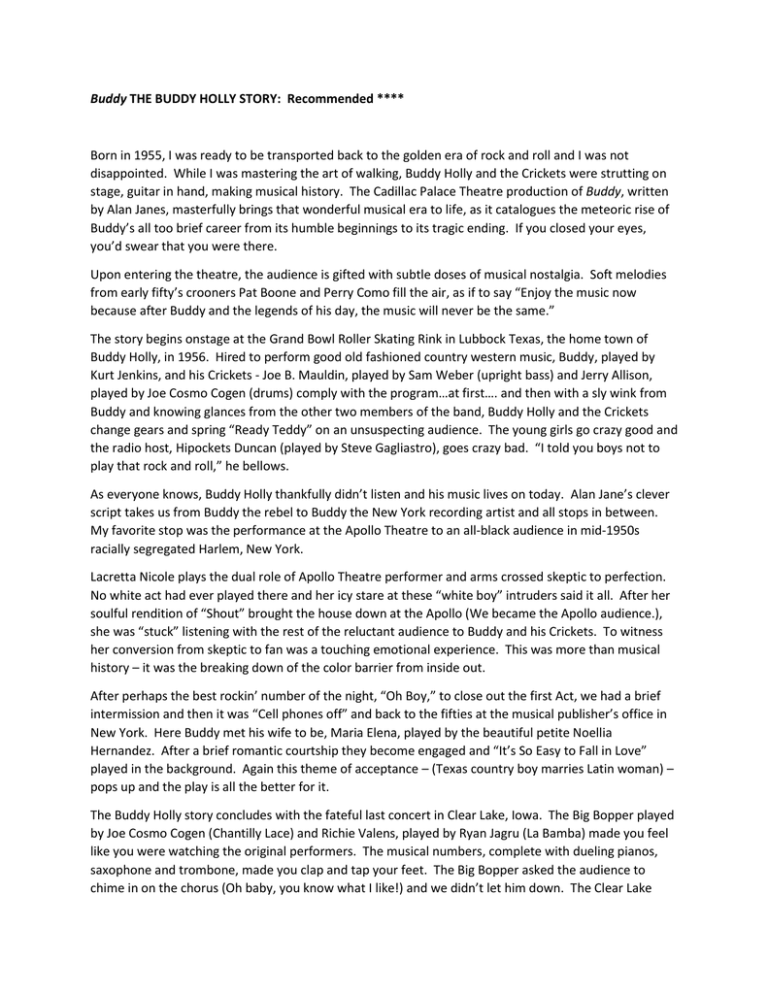
Buddy THE BUDDY HOLLY STORY: Recommended **** Born in 1955, I was ready to be transported back to the golden era of rock and roll and I was not disappointed. While I was mastering the art of walking, Buddy Holly and the Crickets were strutting on stage, guitar in hand, making musical history. The Cadillac Palace Theatre production of Buddy, written by Alan Janes, masterfully brings that wonderful musical era to life, as it catalogues the meteoric rise of Buddy’s all too brief career from its humble beginnings to its tragic ending. If you closed your eyes, you’d swear that you were there. Upon entering the theatre, the audience is gifted with subtle doses of musical nostalgia. Soft melodies from early fifty’s crooners Pat Boone and Perry Como fill the air, as if to say “Enjoy the music now because after Buddy and the legends of his day, the music will never be the same.” The story begins onstage at the Grand Bowl Roller Skating Rink in Lubbock Texas, the home town of Buddy Holly, in 1956. Hired to perform good old fashioned country western music, Buddy, played by Kurt Jenkins, and his Crickets - Joe B. Mauldin, played by Sam Weber (upright bass) and Jerry Allison, played by Joe Cosmo Cogen (drums) comply with the program…at first…. and then with a sly wink from Buddy and knowing glances from the other two members of the band, Buddy Holly and the Crickets change gears and spring “Ready Teddy” on an unsuspecting audience. The young girls go crazy good and the radio host, Hipockets Duncan (played by Steve Gagliastro), goes crazy bad. “I told you boys not to play that rock and roll,” he bellows. As everyone knows, Buddy Holly thankfully didn’t listen and his music lives on today. Alan Jane’s clever script takes us from Buddy the rebel to Buddy the New York recording artist and all stops in between. My favorite stop was the performance at the Apollo Theatre to an all-black audience in mid-1950s racially segregated Harlem, New York. Lacretta Nicole plays the dual role of Apollo Theatre performer and arms crossed skeptic to perfection. No white act had ever played there and her icy stare at these “white boy” intruders said it all. After her soulful rendition of “Shout” brought the house down at the Apollo (We became the Apollo audience.), she was “stuck” listening with the rest of the reluctant audience to Buddy and his Crickets. To witness her conversion from skeptic to fan was a touching emotional experience. This was more than musical history – it was the breaking down of the color barrier from inside out. After perhaps the best rockin’ number of the night, “Oh Boy,” to close out the first Act, we had a brief intermission and then it was “Cell phones off” and back to the fifties at the musical publisher’s office in New York. Here Buddy met his wife to be, Maria Elena, played by the beautiful petite Noellia Hernandez. After a brief romantic courtship they become engaged and “It’s So Easy to Fall in Love” played in the background. Again this theme of acceptance – (Texas country boy marries Latin woman) – pops up and the play is all the better for it. The Buddy Holly story concludes with the fateful last concert in Clear Lake, Iowa. The Big Bopper played by Joe Cosmo Cogen (Chantilly Lace) and Richie Valens, played by Ryan Jagru (La Bamba) made you feel like you were watching the original performers. The musical numbers, complete with dueling pianos, saxophone and trombone, made you clap and tap your feet. The Big Bopper asked the audience to chime in on the chorus (Oh baby, you know what I like!) and we didn’t let him down. The Clear Lake concert songs by Buddy Holly, such as “Maybe Baby, ““Peggy Sue Got Married,” “Raining in My heart,” “It Doesn’t Matter Anymore,” “Rave On,” and “Oh Boy” made you feel like you were at a sock hop. There was unsolicited dancing in the isles – you just couldn’t help it. Kurt Jenkins as Buddy played the part to perfection. He portrayed Buddy’s cool nerd persona with the signature big glasses, true to character. He came to life on stage with Buddy’s moves and mannerisms, exhibiting pure joy as he performed Buddy’s classics. Sam Weber was a sight to behold when he rocked the bass. Not only did he play it, he swung it, stood on it, laid on it, romancing it like a dance partner. Joe Cosmo Cogen was a masterful drummer, with or without drums, as he slapped his thighs in rhythm during the complete performance of the hit song, “Everyday” in the first act. There were a couple spells of overacting but hey, IT WAS ALL ABOUT THE MUSIC! The music is time-less and appealing to any age. Everyone left the theatre grinning with a bounce to their step. To Buddy Holly and the Crickets, Richie Valens, The Big Bopper, and the many other pioneers of rock and roll, thank you for giving your music to the wonderful performers at the Cadillac Palace Theatre so we could hear it once again and feel like we were there. I highly recommend this play.
